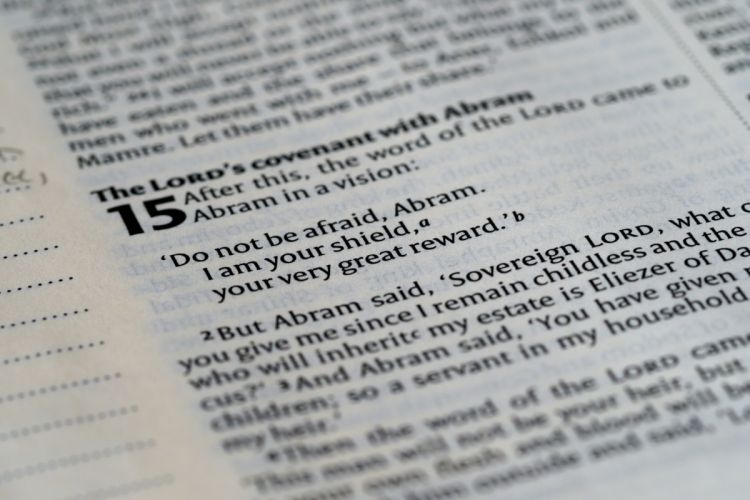Between the first promise of a son given to Abraham (Gen 12:2) and its fulfillment (Gen 21:2), Abraham had some rough patches. Like us, Abraham wavered, and we would not commend his every action to our children.
In particular, Abraham is recorded as calling Sarah his sister instead of his wife on two separate occasions (Gen 12:10–20 and Gen 20:1–18). In fact, Abraham may have demanded this of Sarah repeatedly (Gen 20:13).
This particular stumble may not seem very relatable to modern day Christians. Not many of us, I’d wager, are tempted to introduce our spouse as our sibling. And yet, I suspect we have more to learn from Abraham’s struggles than what first meets the eye.
How Do We Know This is Sin?
Some brief background: After the rescue of Lot and the destruction of Sodom, Abraham sojourned in Gerar, which was between Canaan and Egypt (Gen 20:1). Abraham passed Sarah off as his sister, and Abimelech (the local king) took her for his wife (Gen 20:2). God appeared to Abimelech in a dream and told him about Sarah, instructing him to return her to Abraham. If Abimelech did this, he would live; if not, he would die (Gen 20:7).
When I first studied this passage, I wondered why God didn’t rebuke Abraham. It’s a good Bible study question: How is the reader to know that what Abraham did was wrong?
I eventually realized that God did rebuke Abraham, but he did it through Abimelech (Gen 20:9). God called Abraham a prophet (Gen 20:7), and yet Abraham needed this Gentile king to play the role of prophet and bring the word of God to him. Abraham is an anti-prophet; that is the correction he needed.
The Nature of Abraham’s Sin
It’s too easy, across the distance of history, to judge Abraham for this bad behavior. Even if what he was saying was technically correct (Gen 20:12), he was intending to deceive. I believe the sophisticated word that theologians use to describe Abraham’s explanation is “weasly.”
But because Abraham and Abimelech have an extended conversation, we learn why Abraham acted the way he did (Gen 20:10–13). Further, we see some of the ways Abraham sinned and how we might easily fall into his well-worn footsteps.
Abraham believed God’s influence was limited. He said, “I did it because I thought, ‘There is no fear of God at all in this place.’” Abraham feared falling into the hands of those who didn’t fear God, and he assumed that was true of the people of Gerar. Of course, Abimelech ended up acting more like a God-fearer than Abraham!
Abraham believed God needed help to keep his promises. Abraham thought the people of Gerar would kill him because of Sarah (Gen 20:11). Yet God had promised Abraham an heir through Sarah (Gen 17:16) and this heir had not yet been conceived. This means that Abraham doubted that God could preserve his life without this deception. He had to protect himself because God might not do it.
Abraham doubted God’s goodness. We can hear some resentment and bitterness in the way Abraham recounts his calling: “And when God caused me to wander from my father’s house…” (Gen 20:13). Abraham is not remembering God’s provision, his protection, or his promises. He only recalls the inconvenience God caused him.
When we identify Abraham’s sins this way, I suspect many of us can see our tendency to repeat them. We often doubt God’s power and his extensive reign. We do not cling to his promises or trust him to keep his word. We wonder if God is as good as the Scriptures report.
The Answer is Resurrection
There are many places in the Bible which address these three doubts and teach us what is true. But there is one event which addresses all three.
All the Bible points to Jesus. And Jesus’s resurrection, in particular, is essential. It is the ultimate proof that God keeps his promises, that he is who he claims, and that we have a great hope.
The resurrection proves that Jesus reigns. Paul writes that the resurrection declared Jesus to be the Son of God in power (Romans 1:4). If we suspect that God is limited or that he cannot do the unexpected, the resurrection announces that Jesus is king with a megaphone.
The resurrection proves that God keeps his promises. Jesus taught many things and made many claims. Some of his boldest predictions were of his own suffering, death and resurrection. The truth of his resurrection, being the most audacious claim, verifies all of his teaching. (See 1 Cor 15:17 and Acts 13:16–41.)
The resurrection proves that God is good. In Acts 5:29–32, Peter explains that in his resurrection and ascension, God exalted Jesus as Leader and Savior, to give repentance and forgiveness to Israel. What mercy and goodness is captured in this! Further, Paul famously writes that those who believe will enjoy a resurrection like Jesus’s—in fact, Jesus’s resurrection is the first fruits of the resurrection of the faithful which is to come (1 Cor 15:20–23).
Prone to Unbelief
We are prone to doubt, to unbelief, to attributing ill motives to God. Any of our surface-level sins likely have a root in a heart which isn’t believing what is true.
Notice the forbearance and goodness of God! He faithfully stays with us in our unbelief. And he provides what we need to grow: his Spirit, his Word, and his people.
We believe, and we need God to help us in our unbelief. And this is exactly what he does.

Fantastic! Much needed instruction and perspective. Thank you this is very encouraging and edifying post!